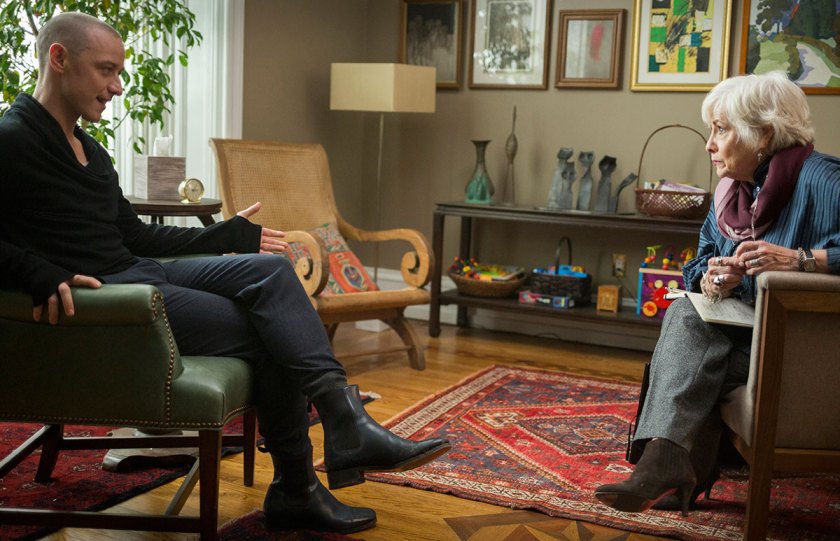Since its premiere at last year’s Fantastic Fest, a lot of people have been calling Split M. Night Shyamalan’s return to form. To an extent, that’s true: it calls of the time when his name was less of a joke and more just a tender punchline. In another way, however, it shows an evolution for the filmmaker. It doesn’t revolve around building towards a singular Shyamalan ending but instead knowingly forms an effective two-hour dread.
Knowing the premise, in fact, seems to double down on the creeping terror. James McAvoy plays an afflicted fellow named Kevin who suffers from an extreme case of dissociative identity disorder to the point where he contains 23 discrete personalities of varying talents, quirks, and affectations. They’re all under the study/care of psychiatrist Dr. Karen Fletcher (Betty Buckley), but one of them is more troublesome than the rest.
His name is Dennis, and unbeknownst to Fletcher or what seems like any of Kevin’s other personalities, Dennis has kidnapped three teenage girls from a parking lot following a birthday celebration. One of them—an outsider—by the name of Casey (Anya Taylor-Joy) is strikingly less phased by this development than the other two, even once they wake up in Kevin’s oddly well-furnished basement together.
Incredibly, that’s the bulk of it, and that’s almost be necessity. The seemingly unwieldy proposition of dealing with over two dozen characters feels somewhat simple when everyone is crammed into just a handful of rooms for 117 minutes. It grows in complex and interesting ways as characters both fall away and get added to the mix, exposing more and more of a psychologically disturbing core.
There’s no grand, overarching anticipation of a twist (and whether or not there is one shouldn’t be covered in a review), the potency of such a thing having faded away since Shyamalan’s heyday. An organic weaving of intricacies and paranoia takes its place as the backstories of Kevin, Casey, and Fletcher come into stark relief. Each part of that triangle feeds into another one and is connected in fascinating ways.
Fletcher, for instance, is attempting to craft a medical report about Kevin’s severe disorder, detailing her theory about how different identities could potentially contain vastly different skills and capacities. One of Kevin’s personalities actually has to take insulin for diabetes while none of the others do. And as the movie goes on, the extremes of this hypothesis and particular case start to bubble up and pop.

Then there’s the reason why Casey acts the way she does, which brings an incredible circularity and parallelism to both her and Kevin’s disparate stories. Each layer is revealed with each of the three girls’ escape attempts, which admittedly also shows just how shallow the other two are, but they also slowly push the viewer closer and closer to the edge of giving up on the girls, Kevin, or anyone else that crosses paths with, well, anyone. It’s a frightening sensation.
And as good as Taylor-Joy is in her role, lending a pervasive darkness to her character that makes her ultimate revelation all the more powerful, the movie is really all about McAvoy. Each personality he exhibits is somehow fully formed and real despite having to wrangle so many of them at once. Costume changes help us visually distinguish them, but they aren’t at all necessary. His ability to make subtle changes in his posture and mannerisms are all you need.
There’s one particular scene where we see multiple personalities erupt in rapid sequence—almost simultaneously, in fact—and it is prowess you haven’t yet seen from him, and that includes his tremendous turn in Atonement. He can be towering, effete, effeminate, enigmatic, treacherous, and more at nothing more than the flip of an internal switch.

The story kind of plays a bit too fast and loose towards the end, delivering payoff for earlier promises while foolishly and shamelessly trying to establish new ones for more immediate reward, too. It’s a great accomplishment that nothing of note goes unresolved (or at least unresolved to an unsatisfying degree), but the rapid velocity at which it barrels towards the credits is as rewarding as it is disagreeable.
Parts of Split would have you fear the worst. Is it another film in which Shyamalan tries to surprise you for the sake of surprise? Upset you just because it can? The premise would suggest yes to either one or both of those questions, but instead, it’s one twist that I would freely discuss with you. It sets you up to expect a grandiose exercise in dealing with terribly grand characterizations, but instead is hyperfocused on make you feel uneasy and fearful until it all boils over in excitement and gripping terror.
Final Score: 8 out of 10

[…] to be, which then in turns diminishes Shyamalan’s otherwise terrific work in Unbreakable and Split. Unbreakable, after all, has long been considered one of the best comic book movies (despite not […]